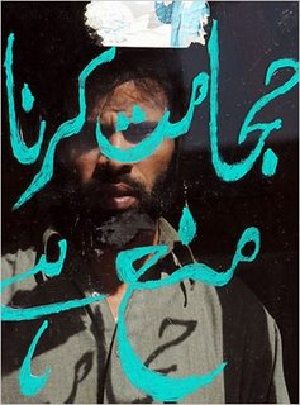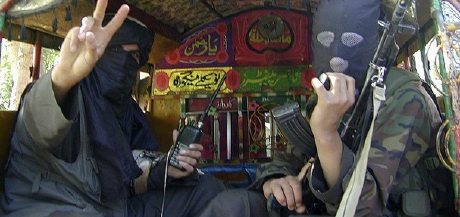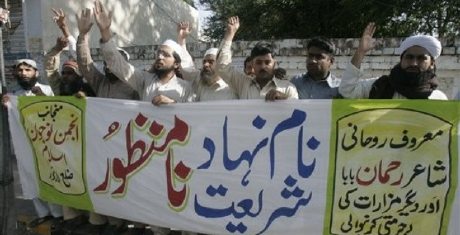Manan Ahmed (Sepoy @ Chapati Mystery)
 The Pakistani Parliament has now passed the bill authorizing Sharia laws in Swat – and perhaps in other territories. Punjab, according to the NYT report, United Militants Threaten Pakistan’s Populous Heart is also in grave danger of going Islamic in a meta-way. Baluchistan has broken out into violence and protests since the president of the Baluch National Movement, Mir Ghulam Mohammad, was kidnapped (along with two other senior associates), shot to death and then their bodies ditched from a helicopter. The primary suspicion falls upon the military or military intelligence. That leaves us Sindh. Karachi, the biggest city in Pakistan, is having a battle of the bands. More seriously, it is also been the scene for ethnic riots against the Baluchi recently.
The Pakistani Parliament has now passed the bill authorizing Sharia laws in Swat – and perhaps in other territories. Punjab, according to the NYT report, United Militants Threaten Pakistan’s Populous Heart is also in grave danger of going Islamic in a meta-way. Baluchistan has broken out into violence and protests since the president of the Baluch National Movement, Mir Ghulam Mohammad, was kidnapped (along with two other senior associates), shot to death and then their bodies ditched from a helicopter. The primary suspicion falls upon the military or military intelligence. That leaves us Sindh. Karachi, the biggest city in Pakistan, is having a battle of the bands. More seriously, it is also been the scene for ethnic riots against the Baluchi recently.
In the meantime, the Obama administration has, to this point, authorized over 60 drone attacks for an al-Qaeda kill rate of 2%. Wonderful.
So, given all this, is there a likelihood of an Islamic Revolution in Pakistan? Is it Game Over?
Before we get there, I want to review a couple more things about Pakistan and its relationship with its constitutive parts. Swat merged with Pakistan, constitutionally speaking, in 1969. However, it has retained the status as a “Special Area†granted under the Yahya Khan One Unit proclamation of 1955. This special status was is recorded into the 73 Constitution, Article 247. According to this status, they are free to make their own laws and govern themselves. The President can, from ‘time to time’, give some directions to the Governor but the Parliament, Supreme Court or any High Court has no jurisdiction. So, the Swat ‘Sharia’ deal is a capitulation insofar as Pakistan has never amended its Constitution to make the FATA territories squarely under its law. Additionally, the Swat deal seems to be the only way to curb Maulana Fazlullah. If Obama is going to talk about ‘good’ Taliban in Afghanistan, Pakistan certainly has the right to make political negotiations to get a cease-fire. The human impact of the last 3 years on Swat valley has been intense – over 300,000 have fled.
Baluchistan, another princely state which was militarily merged with Pakistan after Partition, had no role in the federal state. After the 1955 One Unit Proclamation, the Khan of Kalat tried again to declare sovereignty. General Tikka Khan (‘the butcher of Bengal’) was sent to Baluchistan in 1958 under Ayub’s military rule to enforce federal writ. Things simmered until Bhutto has to send more army troops against another militant uprising in the region from ’72-74. So, there is no love lost between the center and Baluchistan.
Sindh, Karachi, and the Mohajir Qaumi Movement (MQM) are another beeswax. Only recently, rumors were afloat that Musharraf was cutting a deal with MQM and give them autonomy under a federated Pakistan.
Now, to return to this ‘question’.
I would argue that such a formulation of impending doom is one of the main reason Pakistan is in this mess. There is a rich vein of ‘Pakistan on the Brink’ theorization that has dominated US foreign policy since the 50s. Back then, it was the Communist revolution, and now it is the Islamic one. This particular mind-set has propelled one disastrous policy over another for the last 40 years. We have supported dictator after dictator and stood by, silently, when civilian regimes floundered under internal economic and political crises. Once again, this question dominates the Obama policy and will restrict any real re-thinking of the Pakistan issue or re-evaluation of the regional scene. So, let’s just categorically understand that:
- There is a world of difference between ‘Taliban’ and any given Pakistani citizen, even the most devout believer. The Taliban, strictly understood to be warlords operating with or in support of Mullah Omar, are a very particular political group. They are political. They have political goals. They are not, in effect, a religious ideology that has the danger of sweeping Pakistan. They don’t have doctrinarians or theologians. Al-Qaeda does. Taliban don’t. It may seem like splitting hairs but I think it is very important to differentiate between the historically situated Taliban and the groups that have emerged in Pakistan bearing the name ‘Taliban’. In the later case, the term is actually masking other political goals and differences that we need to be carefully attuned to. Similarly speaking, there is a world of difference between a specific political group, however broadly defined, which can be numbered in the thousands and a state of 160-plus million peoples. The people of Pakistan have demonstrated, through a number of elections over the last 60 years, that they do not want their religious leaders in political power. There is no dismissing that reality.
- The most powerful entity in Pakistan in its national army. The second most powerful entity is its civil bureaucracy. The third most powerful are the landed and industrial elite. None of these entities are about to give it up (whatever ‘it’ is – from nukes to bank accounts) to some ragtag bunch of jihadis. Certainly Zardari, wants to keep everything, don’t you know it.
- There is a robust, active, critical media. A media which has played a prominent role in some amazing events in civil and political theaters in the last 3 years.
So, I reject the premise in which the Swat Deal becomes a stepping stone to the ‘Talibanization’ of Pakistan.
Second, Pakistan has always been the Islamic Republic of Pakistan. Pakistan has always self-imagined itself to be a ‘homeland for Muslims’. The question really is: what kind of a homeland?
Saudi Arabia is a homeland for Muslims. It has Shari’a and a King. Malaysia is another homeland for Muslims – with a different sort of emphasis. Turkey, with its emphatic secularism, falls on the far end of such a homeland for Muslim spectrum. Where does Pakistan fit in? And where does it intend to go? I think that is the more important question. What is Pakistan to Pakistanis now? Who is a Pakistani, in effect? As I pointed out in an earlier discussion on the idea of Pakistan, there has to be a fundamental re-articulation of Pakistan as an entity, as a nation-state, within its constitutive parts. The urgency of this task is evident – there are other claimants with answers. Claimants who carry guns and who can brutalize a population in the blink of an eye. There is also the United States agenda, which continues to treat Pakistan as nothing more than a client-state. Somewhere in this pincer, somewhere between the taliban and the drone, the Pakistanis have to begin forming a sense of their whole. I am not big on nationalism and I don’t think that re-imagining Pakistan as a nation is an easy task, either. But, I am not simply talking about some ideological mumbo-jumbo that Islamabad can cook-up.
The most crucial step is that the civilian federal state of Pakistan has to listen – really, actually, listen – to the people of FATA, the people of N.W.F.P, the people of Baluchistan, the people of Sindh and the people of Punjab. It has to provide its citizens with basic security, shelter and welfare. It needs to protect its citizens from terrorism. It needs to strengthen its civic engagement with non-governmental organizations. It needs to ensure that basic human rights and access to a basic educational system is guaranteed to all citizens. These are actions that can be taken and should be taken and they will have a far greater impact than any 1.5 billion dollar aid. The Pakistan military, and the US, must allow for this. It must enable the state, it must pressure the state to fulfill its pledges to the people. Part of that means a military operation against the Taliban (narrowly defined) and al-Qaeda (defined as ‘foreign fighters’ in the press) in Swat and in Baluchistan. This must be under-taken by the Pakistan military.
From such a process, a major process of stabilization, the state can start to re-build.
It’s a tall order, I know. There are too many de-stabilizing forces. Not to mention, an open question mark over whether there is actual political will to do all this. Yet, I remain hopeful. Pakistanis – however we categorize them – have a lot of heart, a lot of soul and great fortitude. For the last 8 years, they have been paying the price of a proxy-war waged on their soil. A decade before, they suffered through another proxy-war which gave them millions of refugees and a radicalizing ideology. They have persevered. I am still in awe of the hundreds of thousands who galvanized against Musharraf and the millions who cast a vote in the election last year. We must support those many millions in taking the next step.
Manan Ahmed blogs as Sepoy at Chapati Mystery where this post was first published and discussed. This was originally written some two weeks ago. Much hass been happening in these two weeks but the essenace of the argument remains unchanged. Hence it is being carried as originally written.






















































AN EXERCISE IN GRAND DENIAL!!!
“Taliban are NOT Pakistanis and Pakistanis will not stand for Taliban”
-Then why not kick them out; and if they resist, why not liquidate them?
-Or one should wait till they become a menace and nuisance like LTTE in Sri Lanka , and then deal with the Talibans the way Lankans are dealing with LTTE now after so much cost and misery
It seems that people in Pakistan have forgotten- A stitch in time saves nine .
Let me add my worthless analysis to the list of armchair analyses on this posting :). Even if these dreadful forms of life known as Taliban overrun Pakistan, nothing is forever. These beasts lasted 5-6 years in Afghanistan, a collection of tribes and ethnicities that produced and incubated them in Pakistan with the connivance of the CIA and Zia’s ISI. When they took over Afghanistan it was nowhere close to Pakistan in any sense. Pakistan will break up only if the United States invades and divides it ala Iraq. That doesnt seem possible given they are over stretched and took almost 15 years from Vietnam before they could conduct an overt war with anyone. CIA’s foolish theory that India will take Sindh and Punjab, Iran will take Baluchistan and Afghanistan will take over NWFP has me LMAO. This is not a statement based on fake patriotism. It’s based on the overall situation in these areas of Pakistan. Who in their right mind would want to touch these regions of trouble. Would they be willing to facilitate Pakistan’s breakup?We don’t have oil and we’re not Christian (East Timor anyone?) who would do it? Slum dog millionaire India? Its in bed with the US and pregant with US dollars riding the tide of a make believe super power and trying hard to come up to China. Would it risk all that it has earned overnight to own and operate a broken and fragmented Pakistan? What will happen to this broken Pakistan? will if evaporate or dissolve?
Too bad the US lost the opportunity to use Pakistan as a true and loyal ally like Israel. Had it invested in Pakistan since it’s inception in 1947 like it did in Israel (the only other country established on the basis of religion) we would have seen different results today. The Israelis have had a lobby in Washington for the last 100 years, we didn’t. But we were more subservient than the Israelis and never stole technology, spied on and bit the hand that fed us or had the awareness of rights and the experience of living in a civilized societies of Europe. We were slaves to the British for 150 years and could have proven to be an excellent subservient satellite state for the United States. Repetitive failure of US-Pakistan relations is solely the failure big brothers foreign policy. Where does our responsibility lie? We were a nation of 70 million bhooka nangas in 1947 crying about what we didn’t get from India and lament that to this day never asking ourselves what we could have done or achieved had we been nation with self respect. We sold ourselves to the dollar everytime without thinking about the consequences and far reaching implications of our short term actions on ourselves and our future generations. So we have no right to complain and blame every tom, dick and harry on the planet. We have ourselves to blame when it comes to introspection. Yes we will not become a theocracy because history has shown theocracy has failed every time. Infact any form of absolute philosophy that usurps the rights of many and puts power in the hands of a few has failed. We may not live to see a theocratic and barbaric Pakistan overrun by the beasts of extremist theological following fail in our lifetimes but they will fail. A new Pakistan or a newer race will rise from the ashes of the coutry our forefathers put together. Religion has no place in the echelons of power. It’s rightful place is in mosques and churches for people to seek solace. History has proven that over and over again.
another denial story
Typo-mistake. Its 4000 and not 400
Superficial analyis. A lot of facts missed here. Do you really think that 400 taliban can hold their own against 20 to 40 thousand of our troops. UNless ofcourse as discussed in our media, they have been and still are bed fellows. It is now public thta our army played a disgusting rile in swat crisis and the whole tragedy was nothing but to fail the nationaist governmet of ANP. Its a firm belive in army that talibans are true muslims and patriots and a proxy against nationalist pakhtoons. THe media has been aware of it. THey questioned army’s role in swat. Why the SWATI’S WERE LEFT ALONE. What happend to Pir Samilullah. Why the army retaliates only when THEY suffer casualities as in case of Banu. WWhy FC and police is left on its own.
Why .4 million people migrated from swat. HOw 4000 held sway over 2 million people of buner and swat. It was only through our army. Do you really think that peopel of swat where 80% are associated with the hotel industry wanted a shariat like this one. Imagine a tourist heaven/hell where you dont have a TV. You cannot listen to music. You cannot record your memories. YOur spouse has to wear a shuttle cock and you have to don a beard with your shalwar above your ankles. YOu cannot have privacy atleast 5 times a day. YOu must present yourself not before God but the Mullah. Swatis are smart people. They never wanted such shariat. So please next time, present a relaistic indeptrh analysis.